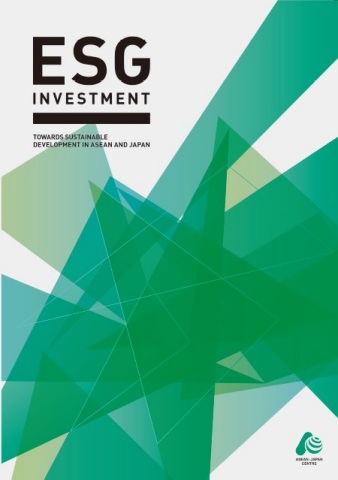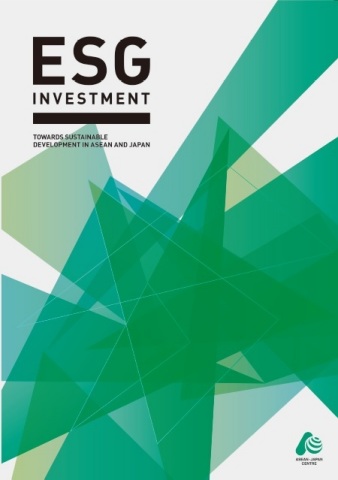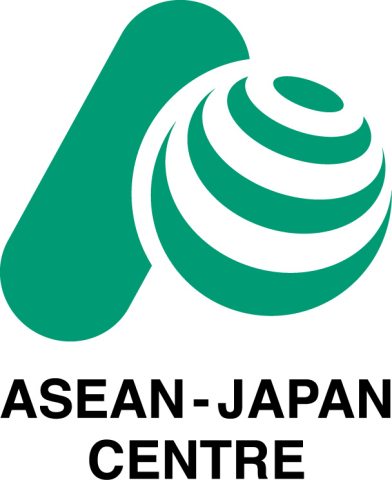TOKYO--(BUSINESS WIRE)--ESG investment has been implicitly and unsystematically undertaken among the ASEAN firms but it is promising, according to a study on the ESG Investment in the ASEAN region released by the ASEAN-Japan Centre (AJC).
Environmental, social, and governance (ESG) investment has gained momentum around the world and the force is moving towards Asia, especially in the ASEAN Member States. Against this backdrop, AJC, an intergovernmental organization of ASEAN and Japan based in Tokyo, issued a study “ESG Investment: Towards Sustainable Development in ASEAN and Japan” (https://www.asean.or.jp/en/wp-content/uploads/sites/3/ESG_web.pdf) to urge investors to invest responsibly by understanding ESG investment and contribute to the better and sustainable investment environment and society in Japan and the ASEAN Member States.
Major messages of the study are as follows:
ESG investment is for all investors
Since ESG investment is
originally from the financial market, it is commonly perceived that ESG
investment is only for financial investors. However, ESG factors should
be a priority for all investors, including investors in the real sector
or entrepreneurs. ESG is not only important as a signal to investors,
but, as it is conducive to business objectives and value-generating, it
is crucial for maximizing profit for all companies. ESG can even help
new companies and small and medium-sized enterprises to enhance their
productivity and competitiveness. Therefore, all companies, regardless
of their sizes and whether they are listed on a stock market, should
integrate ESG investment in their core business strategies and consider
ESG investment as an essential part of the growth strategies.
ESG investment is moving away from niche to norm
There is
growing demand for ESG investment around the world and gradually to
Asia, especially ASEAN. In particular, ASEAN-5 shows a promising trend
of ESG investment, whereas more efforts are necessary for the rest of
the member states.
ESG investment associates with higher profitability
ESG
investment helps firms lower costs and boost up revenues and profits.
Our main finding shows that ESG firms’ profitability is, on average,
higher than that of non-ESG firms. The ratio of net profits to total
revenue is 11.4% for ESG firms as opposed to 9.6% for non-ESG firms.
ESG investment has been implicitly and unsystematically implemented
among the ASEAN firms
This implies potential growth of ESG
investment in ASEAN countries. The main challenge is that, even though,
ESG factors are found in firms’ sustainability and governance
strategies, those firms find difficulty to fully integrate ESG
investment in their core business strategies. Therefore, further efforts
should be spent on the explicit and systematic integration of ESG
investment.
ESG investment is implemented creatively and innovatively among ASEAN
entrepreneurs
AJC found that ASEAN ESG firms are very creative
and innovative in integrating ESG investment in their business
strategies. Taking into account ESG factors, they offer new business
solutions and products to their clients, while utilizing new technology
and innovation in their production.
ESG investment in ASEAN is promising; however, challenges remain
At
present, ASEAN firms have not fully integrated ESG investment in their
core business strategies. This challenge is constituted by several
factors, including a) wrong perception towards ESG investment, b)
limited capability to fully integrate ESG investment, and c)
insufficient guideline and supports from exchanges and the government.
In addition, there is still a weak link between the ESG investment and
the achievement of the SDGs. Further progress by firms, exchanges, and
policymakers is particularly important given this context. These
challenges should be addressed urgently to take advantage of the growth
potential for ESG investment.
ESG investment can be fully integrated into core business strategies through the following practical steps: a) changing perception towards ESG investment to recognize the increasing importance of and demand for ESG; b) planning for an effective ESG strategy by pursuing quantifiable targets and understanding sustainability issues faced by a specific business and industry; c) taking actions with creativity, flexibility, and innovation to turn challenges into opportunities; and d) working with peers and involve all stakeholders to make full use of the combined knowledge and economies of scale.
ESG investment should be further promoted and supported by exchanges and the government: Regulators and policymakers can help further the progress of ESG investment by a) communicating benefits of ESG investment as firms’ misperception towards ESG investment is among the top agenda; b) implementing a mandatory sustainability disclosure regulation for both listed and non-listed entities; c) providing specific guideline and supports, e.g. individual consultation session, a dialogue that includes all stakeholders, among others; d) evaluating firms’ ESG performance periodically to promote a competitive environment among firms and involve all stakeholders in the monitoring process; e) taking advantage of the digital age; and f) emphasizing the linkage between ESG investment and SDGs to create a better, more sustainable investment environment and society.
To download the paper, please visit the AJC website at
https://www.asean.or.jp/en/wp-content/uploads/sites/3/ESG_web.pdf
ASEAN-Japan Centre
The ASEAN-Japan Centre is an intergovernmental organization established
by the ASEAN Member States and Japan in 1981. It has been promoting
exports from ASEAN to Japan while revitalizing investment, tourism as
well as people-to-people exchanges between the ASEAN Member States and
Japan.
URL: https://www.asean.or.jp/en/




